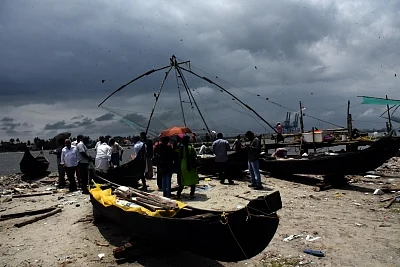Kochi, June 2 (IANS) Kerala's fisheries sector is suffering huge economic loss owing to uncontrolled juvenile fishing, according to a study done by the Central Marine Fisheries Research Institute (CMFRI), which was presented here on Saturday.
As part of CMFRI's research project for developing a fisheries management plan for the fisheries sector of Kerala, it found that the most caught juvenile fish during the last year was threadfin breams that caused a loss of Rs 221 crore to the state fisheries sector.
For fishes, the stage between birth and adulthood is often referred to as the juvenile period or in other terms the juvenile stage lasts until the fish is fully grown, sexually mature and interacting with other adult fish. The catch in the form of juveniles is harmful as it reduces future yield.
Apart from the loss to the economy, juvenile fishing also badly affects the biological factors of the fish ecosystem.
The unscientific practice leads to disruption in recruitment and spawning stock biomass of the fish, states the report.
T.M. Najmudeen, Principal Scientist at the CMFRI and the Principal Investigator of the project, presented the report at a stakeholders meeting held at the CMFRI to discuss the studies carried out by the institute during the last year.
Present on the occasion were representatives of fishermen associations, trade unions, seafood exporters association, officials from the Wildlife Trust of India and the State Fisheries Department.
Principal Scientist at CMFRI E.M. Abdussamad said unfavourable climatic conditions following the El Nino badly affected the spawning and growth pattern of the oil sardine.
During the discussion, fishermen pointed out that the curb on juvenile fishing will be meaningful only if there is uniformity in implementing regulations across the country.
They urged the CMFRI to study the migratory pattern of the demersal fishery resources and requested that the Centre should ensure that national policies are formulated strictly on the basis of scientific facts avoiding any kind of political influence.
--IANS
sg/qd/bg
(This story was auto-published from a syndicated feed. No part of the story has been edited by The Quint.)
(At The Quint, we question everything. Play an active role in shaping our journalism by becoming a member today.)
